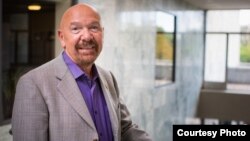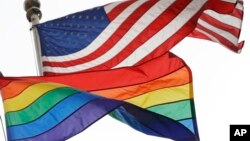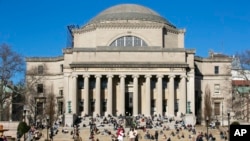Student Union
Best Buy Founder Spreads Seeds to Grow Student Startups

When Dick Schulze started his business 52 years ago, he mortgaged his home to seed his business, the consumer-electronics retailer Best Buy.
This week, Schulze and the foundation named for him awarded $250,000 in startup funding to college students with great business ideas.
“It’s possible to build a meaningful company, a very successful, and in our case, a very large-scale company from a very, very small startup,” said Schulze from the University of St. Thomas in Minneapolis, Minnesota, where he is an alumnus, trustee and major donor. While Schulze has retired from Best Buy, the company just reported more than $42 billion in revenue, according to its annual report.
The Richard M. Schulze Family Foundation notes age may no longer a barrier for young people with good business ideas, but funding remains a hurdle.
Ask sophomores Jackie Page and Meghan Sharkus, students at St. Thomas.
They make adhesive patches that secure medical devices like Dexcom, which monitors the blood glucose levels of diabetics. The adhesives are a less bulky alternative and secure the device during exercising or bathing. And Page and Sharkus designed them to make device-wearing attractive, rather than visually uncomfortable.
Some are fashioned to resemble tattoos. One uses a snowflake motif. Others are sporty.
Of 25 college-age finalists with business models, Page and Sharkus’s ExpressionMed, won them $75,000 from Schulze's foundation.
“They took it upon themselves to align strategically with partnerships of other people that could help them understand what it was going to take to make their product really, truly different and better than what was in the marketplace,” Schulze said.
“So they distinguished themselves not only to us, but also to those who have had the opportunity to use the ExpressionMed ‘fashion,’ or form of adhesives that hold these absolutely necessary medical devices close to the patient.”
They started with $5,000 of Sharkus’s high-school graduation money. She earned $30,000 more in competitions the following year. They have generated sales revenue, and now add the Schulze prize money to their business.
Sharkus said St. Thomas has given her and Page time to spend with professionals and mentors from outside school, talking about business models.She said that this made the school the perfect place to start a business.
"Just being in that environment makes school the perfect place to start a business, and,especially for young people. You know, we do get looked down on sometimes by certain people, being women, being young, being new to the space. But if you are well-educated and you do your research ahead of time and you have the market stats and your product works you can really do anything," she said.
Page and Sharkus also credit their success to researching their product and market, and partnership with medical startups in Minneapolis, who helped them understand and overcome obstacles they would face.
“When I call someone, and they say something isn’t possible, that’s a challenge!” said Sharkus. “I just get so excited about it! And then when it works, that’s the most fulfilling thing.”
Sharkus said time management is the best advice she gives to students who want to start a business.
“The first thing that people worried about was balancing [entrepreneurship] with school and with friends,” Sharkus said. “But what we found was that you’d be surprised at how much time you have if you don’t watch Netflix, and, you know, go out every day.”
Other winning ideas devised a way to improve school bus routes to reduce carbon emissions and save money for school districts, a temperature-regulated mask for weather-triggered asthma attacks, and 3D printing for metal parts.
Schulze said the most successful people are typically the most passionate about building a business and following their dream.He said they don’t take “no” for an answer, seek out answers, network openly, and share ideas to grow their dreams.
The Richard M. Schulze Family Foundation says it follows its founder’s beliefs in the value of innovation and in improving the lives of middle-and working-class families.”
Which is where Schulze got his start.
“For me, personally, it was really a matter of mortgaging the ranch. When I started the company back in 1966, it was really about taking what little funding we had and equity from our home, a loving spouse that was willing to take that risk with me, and we invested it in a business with the help and support of, in my case, manufacturers,” Schulze said.
See all News Updates of the Day
- By VOA News
Indian newspaper offers tips for US-bound students

Telangana Today, a newspaper in India, offers a list of tips and resources for students planning to study in the United States.
Among them:
- Prepare for your travel to the U.S., making sure to gather all necessary documents, including your passport and visa.
- Be sure to attend orientations.
- By VOA News
Michigan State international students get their own space

Michigan State University in East Lansing, Michigan, is setting aside a space in the International Center for international students.
Nidal Dajani, vice president of the school's International Student Association, said that the club plans to use the space to host events and hopes to collaborate with other student groups.
- By Dylan Ebs
International students find community during Pride Month

For LGBTQ+ international students, Pride Month, observed in June, is a unique time to reflect.
They hold on to multiple identities — both their LGBTQ+ identity and their cultural background — but coming to terms with them is not always easy.
For graduate student David Zhou, these identities can feel conflicting as transgender rights in China remain a controversial issue and spaces for LGBTQ people close. Zhou, 25, is transgender and pursuing an education in the STEM field at an urban university in the Midwestern United States.
VOA is using a pseudonym for Zhou’s first name and is not naming his university to protect his identity due to safety concerns back home in China. Zhou is not open about his transgender identity to his family.
During Pride Month, Zhou said he attended multiple LGBTQ+ events in his community and is surrounded by a supportive group of LGBTQ+ students who can relate to his experiences. But he’s not open about his identity to everyone on campus and said he doesn’t disclose his preferred pronouns to everyone to avoid transphobic comments.
“I feel like I have to make some judgments of the character of that person to see if they’re a good person to disclose [my identity] to,” Zhou said.
Zhou’s Pride Month celebrations included attending local markets with LGBTQ+ vendors and hanging out with his LGBTQ+ friends.
“They normalized being trans and for a long time I feel like trans identity is, should I say a vulnerability, brings me fear and worrying about discrimination, but having those events are helpful because it allowed me to see that queer people could just [live] openly,” he said.
At social events where few international students are present, Zhou said it can be tough to fit in.
“There's a lot of times like when they were talking about things I kind of, don't really understand, mostly because I kind of lack some background experience or knowledge,” he said.
Zhou said he is not aware of specific groups for LGBTQ+ international students at his university, but said international students are more prevalent in graduate programs and therefore find representation in organizations for LGBTQ+ graduate students.
In China, transgender individuals must obtain consent from an “immediate family member,” even for adults hoping to transition, which critics say limits the autonomy of transgender individuals while supporters say the policy protects doctors from violence by upset parents.
Struby Struble, a former coordinator of the University of Missouri LGBTQ+ Resource Center, told NAFSA: Association of International Educators in 2015 that LGBTQ+ international students face a “double barrier” on campus.
“With their international student friends, they feel isolated because they’re the LGBT one,” she said. “But then among the LGBT students on campus, they feel isolated because they’re the international one.”
Nick Martin, associate director of the Q Center, Binghamton University’s LGBTQ+ student support office, said when international students tour the center, there’s often a sense of hesitation as they enter a type of space that may not be present in their home country.
“I compare that to a year in after they've come into the space, they've again, maybe come to some of our events, they've got more connected,” he said.
Martin said graduate students have a unique interest in the Q Center as they may use the office for research and advocacy purposes that align with their studies.
“For older students, there may be hesitancy in a different way, but I think it's more in the vein of they want to do some of the advocacy work,” he said.
Martin said he thinks about how both his office and BU’s international student office can support students who come from countries with few — if any — protections for LGBTQ+ individuals.
“It's been a learning process of what those students really need, but I think I've kind of learned that a lot of students are just looking for the safe space that we offer,” Martin said.
- By VOA News
International students discuss US campus culture shock

International students at De Anza College in Cupertino, California, talked about culture shock in an article in La Voz News, the student newspaper.
"It felt like a major culture shock. Everything was so different, from academics to mannerism," said a student from Mexico.
Read the full story here.
These are the most expensive schools in the US

High tuition costs along with housing and food expenses can add up for students at U.S. colleges and universities.
MSNBC looked at the most expensive schools in the country, with one costing more than $500,000 for a bachelor’s degree. (June 2024)







